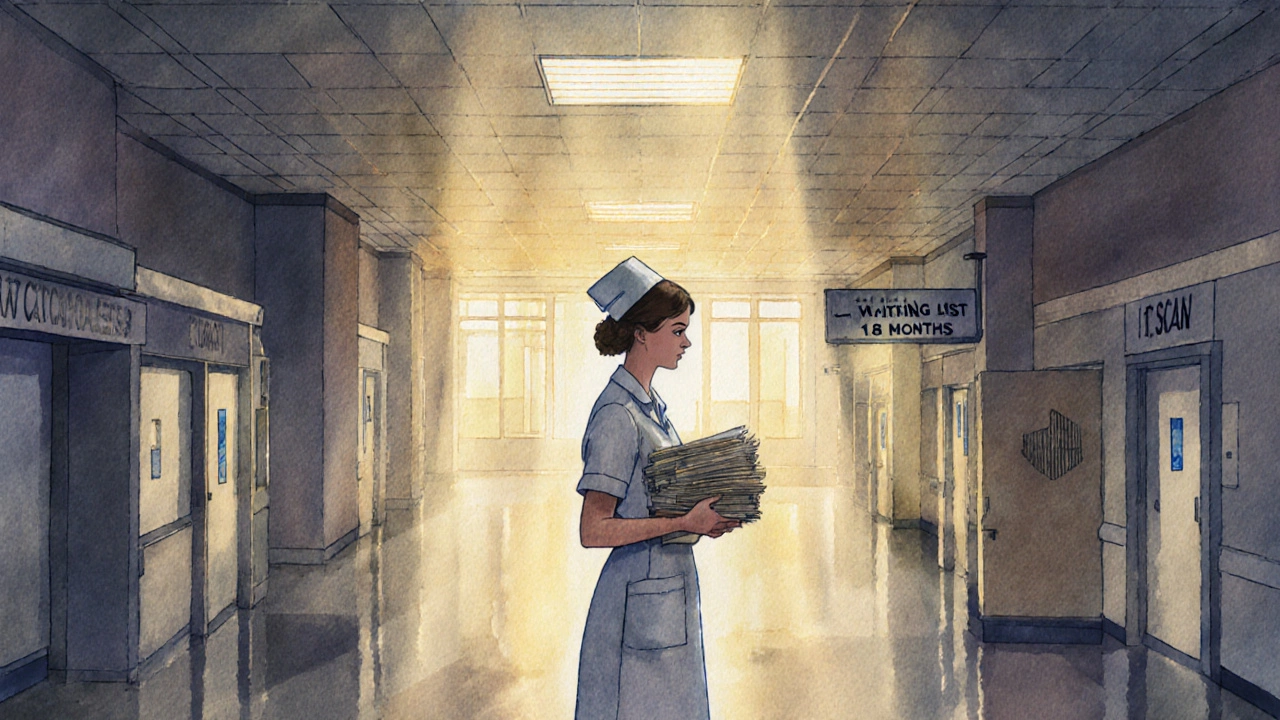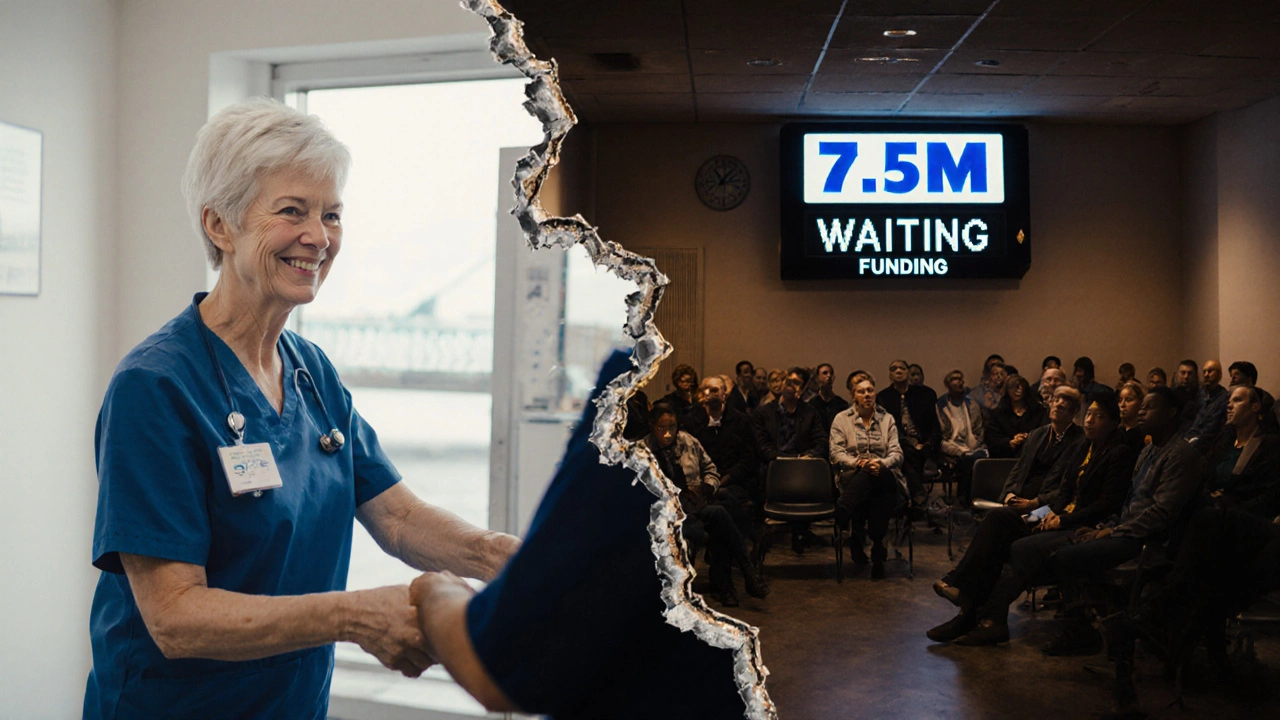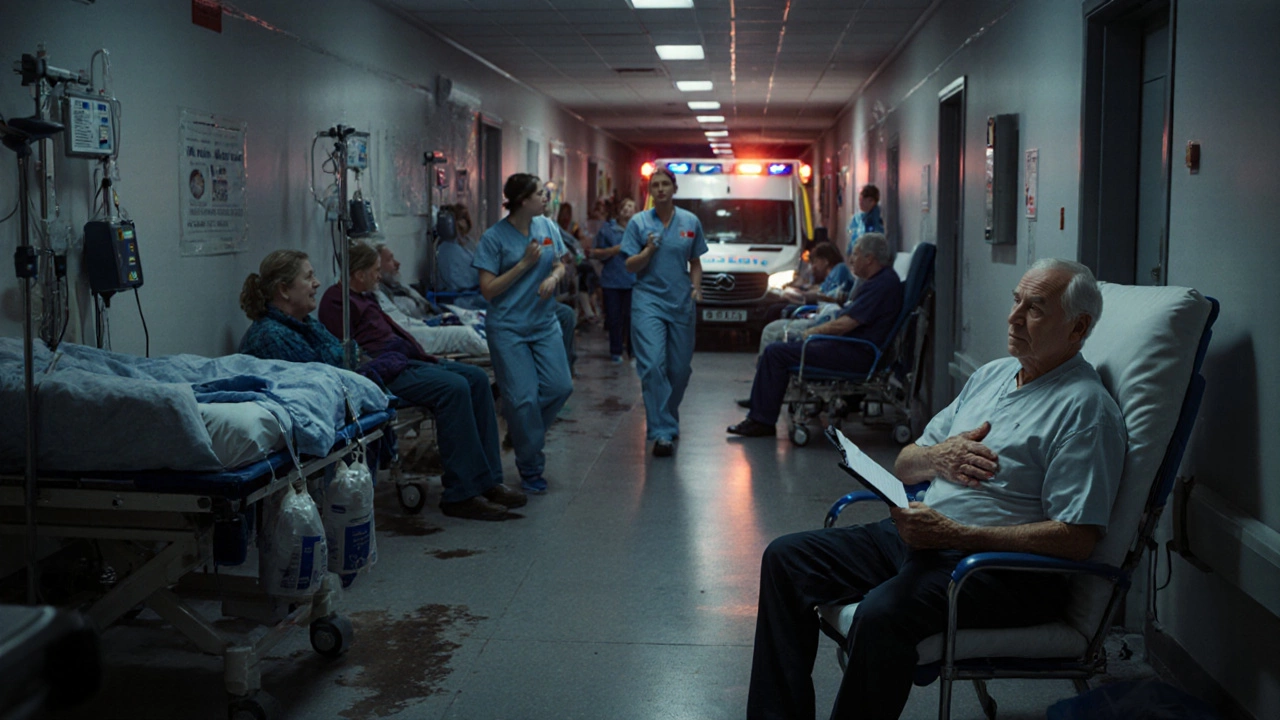UK Healthcare Wait Time Estimator
Your estimated wait time:
Based on 2025 NHS data: Over 7.5 million patients waiting for routine treatment, 20% longer waits in rural areas, and 40% of patients waiting 6+ months for non-urgent care.
Everyone talks about the NHS like it’s a sacred cow-free at the point of use, universal, the pride of the nation. But if you’ve ever waited six months for a knee scan, been told your GP can’t fit you in for three weeks, or watched a loved one slip through the cracks because the system was too stretched to notice, you know the reality is different. The UK healthcare system isn’t broken. It’s running on fumes.
Long Wait Times Are the Norm, Not the Exception
Waiting lists aren’t just long-they’re growing. In early 2025, over 7.5 million people in England were waiting for routine hospital treatment. That’s more than the population of Scotland. For non-urgent surgeries like hip replacements or cataract removals, waits of 12 to 18 months are common. Emergency departments are overwhelmed. Ambulances queue outside A&E for hours because there are no beds inside. One NHS nurse in Manchester told me she once had to wait 11 hours for a patient to get a CT scan because the radiology department was backed up. That’s not a rare case. It’s Tuesday.
It’s not just about delays. It’s about the human cost. People with early-stage cancer are being diagnosed later because referrals get stuck. Chronic pain patients are prescribed painkillers instead of physio because there’s no one to refer them to. Mental health services? You’re lucky if you get a callback within a month-and that’s only if you’re deemed “severe enough.”
Staff Are Burned Out and Leaving in Droves
The NHS has lost over 100,000 staff since 2019. Nurses, paramedics, GPs, radiologists-they’re quitting. Why? Pay hasn’t kept up with inflation. Workloads have doubled. Many are working 60- to 70-hour weeks just to keep the system from collapsing. In 2024, over 40% of NHS nurses said they planned to leave the profession within five years. That’s not turnover. That’s a slow-motion exodus.
General practice is in freefall. In 2025, nearly 1 in 5 GP surgeries in England stopped taking new patients. In rural areas, you might need to drive 30 miles to find someone who’ll see you. And when you do get an appointment? You’re lucky if you get 10 minutes. That’s not care. That’s triage under pressure.
Funding Doesn’t Match Need
The UK spends about 9.7% of its GDP on healthcare. That’s less than Germany (11.7%), France (11.4%), and even Canada (11.1%). Adjusted for population age and illness rates, the UK spends less per person than most comparable countries. And what money there is? A third of it goes to administrative costs-billing, paperwork, bureaucracy. The NHS has more managers than doctors in some regions.
There’s no mystery here. When you underfund a system that serves 67 million people, you get longer waits, fewer staff, and lower quality. It’s not a bug. It’s a feature of the current model.

Access Isn’t Equal
Where you live still determines how well you’re treated. In London, average waiting times for elective surgery are 20% shorter than in the North East. Rural communities have fewer specialists, fewer pharmacies, and no walk-in centers. A diabetic in Cornwall might wait twice as long for a foot scan as someone in central Birmingham. And if you’re not a UK citizen? You’re charged upfront for almost everything-even emergency care.
Even within the system, inequality runs deep. People with private health insurance can skip the queue. They get faster scans, shorter waits, and access to specialists who won’t see NHS patients for months. This creates a two-tier system where your postcode and your bank account decide your health outcomes.
Prescriptions and Dental Care Are No Longer Free
Yes, the NHS is free at the point of use. But that’s not the whole story. Prescription charges in England are £9.90 per item. For someone on multiple medications, that’s £100+ a month. Wales, Scotland, and Northern Ireland have abolished them. England hasn’t. And dental care? It’s practically privatized. Only 40% of NHS dentists accept new NHS patients. The rest work privately, charging £100-£300 for a basic check-up. Many people avoid dental care until it’s an emergency-then they end up in A&E with an infection, costing the NHS far more than a simple filling ever would.

Technology Is Outdated
Many NHS hospitals still use fax machines to send patient records. Electronic systems are fragmented. Your GP’s records might not talk to the hospital’s system. Your blood test results might be on paper in a file cabinet. Digital health records were promised over a decade ago. Progress? Glacial. The 2023 National Audit Office report found that 70% of NHS trusts still rely on manual processes for key tasks like discharge planning and medication reconciliation. That’s not just inefficient-it’s dangerous.
People Are Turning to Private Healthcare
More than 1.2 million people in the UK now have private health insurance. That number is rising every year. Why? Because they’ve had enough of waiting. Private patients get seen within days, not months. They get choice. They get comfort. And while it’s not affordable for most, it’s becoming a necessity for those who can pay.
But here’s the catch: the NHS is losing its best staff to private practice. Consultants who used to work 3 days a week for the NHS now do 5 days privately. The NHS is left with the leftovers. And the cycle continues.
It’s Not About Money Alone-It’s About Priorities
The UK has the technical ability to fix this. We have skilled professionals, world-class research, and the infrastructure. What’s missing is political will. Every government since 2010 has promised to “protect the NHS.” But they’ve cut funding, outsourced services, and ignored the warnings. They treat healthcare like a budget line item, not a human right.
The truth? The NHS isn’t failing because it’s socialist. It’s failing because it’s starved. And until we stop pretending that free healthcare can run on goodwill and hope, the problems will only get worse.




